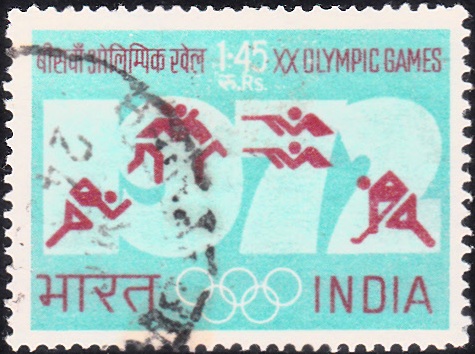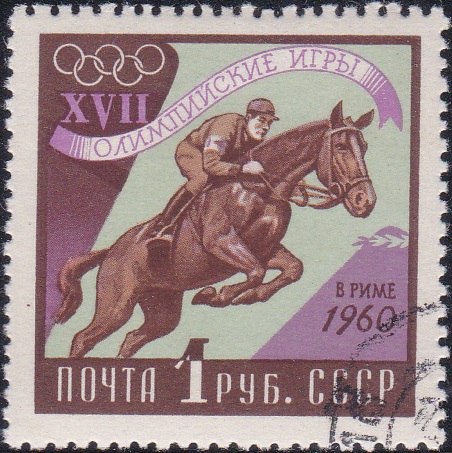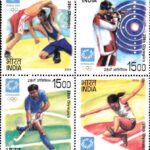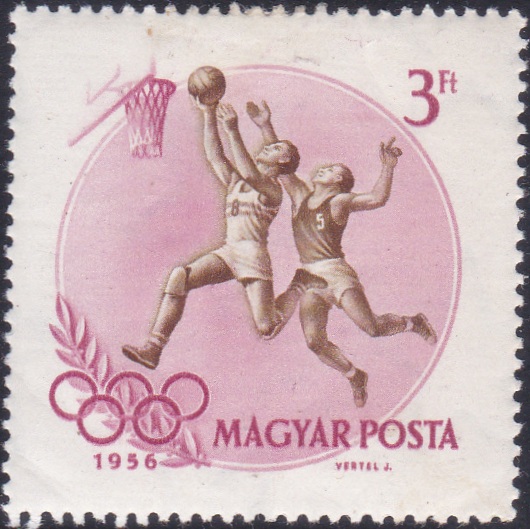
India in XX Olympic Games 1972
Complete Set of 2 nos of commemorative postage stamps on the 20th Summer Olympic Games 1972, Munich, West Germany :
Issued by India
Issued on Aug 10, 1972
Issued for : The Indian Posts and Telegraphs Department is celebrating India‘s participation in this year’s Olympic Games by issuing two special postage stamps in the denominations of 20 paise and Rs. 1.45 on the 10th August, 1972.
Description of Designs : The 20 Paise stamp depicts a hockey player in action and the Rs. 1.45 stamp shows symbolically running, wrestling, shooting and hockey playing with the figure 1972 in the background. The symbol of the Olympic Games has also been incorporated in both the stamps.
Colour :
20 P. – Gravure Blue Grey
Rs. 1.45 – Turquoise Blue & Brilliant Red
Type : Stamps, Postal Used
Denomination : 20 Paise and Rs. 1.45
Overall Size : 3.91 X 2.90 cms.
Printing Size : 3.56 X 2.54 cms.
Perforation : 13 x 13
Watermark : Printed on unwatermarked adhesive stamp paper
Number Printed : 30,00,000
Number per issue sheet : 35
Printing Process : Photogravure
Designed and Printed at : India Security Press
About :
- The Olympic Games was born in Greece many centuries before the birth of Christ, and was held without a break for 1,370 years. The ancient Greeks celebrated this “Festival of Youth” every four years, until it was suppressed by the Roman Emperor, Theodosius in 394 A.D. More than 1,500 years after the Olympic “flame” was finally put out at Olympia, it was again lit at the brand-new stadium in Athens, Capital of Greece to mark the rebirth of the Olympics. The revival of the Games was due to the devoted zeal of a French nobleman Baron Pierre de Coubertin, who is regarded as the “Father” of the Modern Olympic Games.
- Since the First Games in Athens in 1896, the Olympics has been held 16 times, and the Games had to be abandoned thrice (1916, 1940 and 1944) because of the two World Wars. The Olympic family consists of 127 member nations. The Olympic Games is different from all other “international” sports competitions, because it is not a ‘world championship.’ In keeping with ancient Greek tradition, it is not a sum-total of sporting contests, but a ‘Festival’ in which Man celebrates his humanity.
- India is one of the oldest Asian members of the Olympic family, joining the International Olympic Committee in 1927. But, even before this, Indian participants appeared in the Olympic arena in the 1920 Games (Antwerp) and the 1924 Games (Paris). India‘s main interest in the Games has been hockey, a game in which the country enjoyed world leadership for an unbroken span of 32 years in six Olympic Games in a row. This is a record surpassed only by the United States in basketball. India lost the Olympic hockey crown to Pakistan at Rome (1960) and regained the title in the 1964 Games in Tokyo. In the last Olympics (Mexico City, 1968) India was pushed down to third place-failing to get into the final for the first time in 40 years.
- The only Indian so far to win an Olympic medal in an individual event is wrestler K. D. Jadav, who was placed third in the free-style bantamweight class at Helsinki (1952). It is of interest that in the II Olympic Games (Paris) a young Anglo-Indian youth of Calcutta, Norman G. Pritchard, won the silver medal in the men’s 200 metres sprint. Nothing, however, is known of the circumstances in which Pritchard went to Paris. But the Olympic record describes Pritchard as an “Indian”.
- Among other notable Indian participants is Milkha Singh, popularly known as the “Flying Sikh.” In the Rome Games, Milkha Singh became the first Indian to enter the final of an athletic event. In 400 metres Milkha Singh broke the Olympic record, but was placed fourth. Another Indian athlete, Gurbachan Singh, finished fifth in the 110 metres hurdles in Tokyo. Several Indian wrestlers have won the “Olympic Diploma,” which is awarded to competitors who fall to win a medal, but are placed among the first six in any event.
- The Munich Games, XX in the series, is the second to be held in Germany – the first was held in Berlin in 1936. Indian participation in the Games, apart from hockey, will be in athletics, boxing, wrestling, weight-lifting, yachting and shooting. Whether India is able to regain the hockey title or not and whatever our fortunes in the other events. India will live up to the Olympic ideal that taking part is more important than winning.









[…] – Badminton had made its first appearance in 1972 Summer Olympics as a demonstration sport. Two decades later, Badminton had its debut at the 1992 Summer Olympics […]